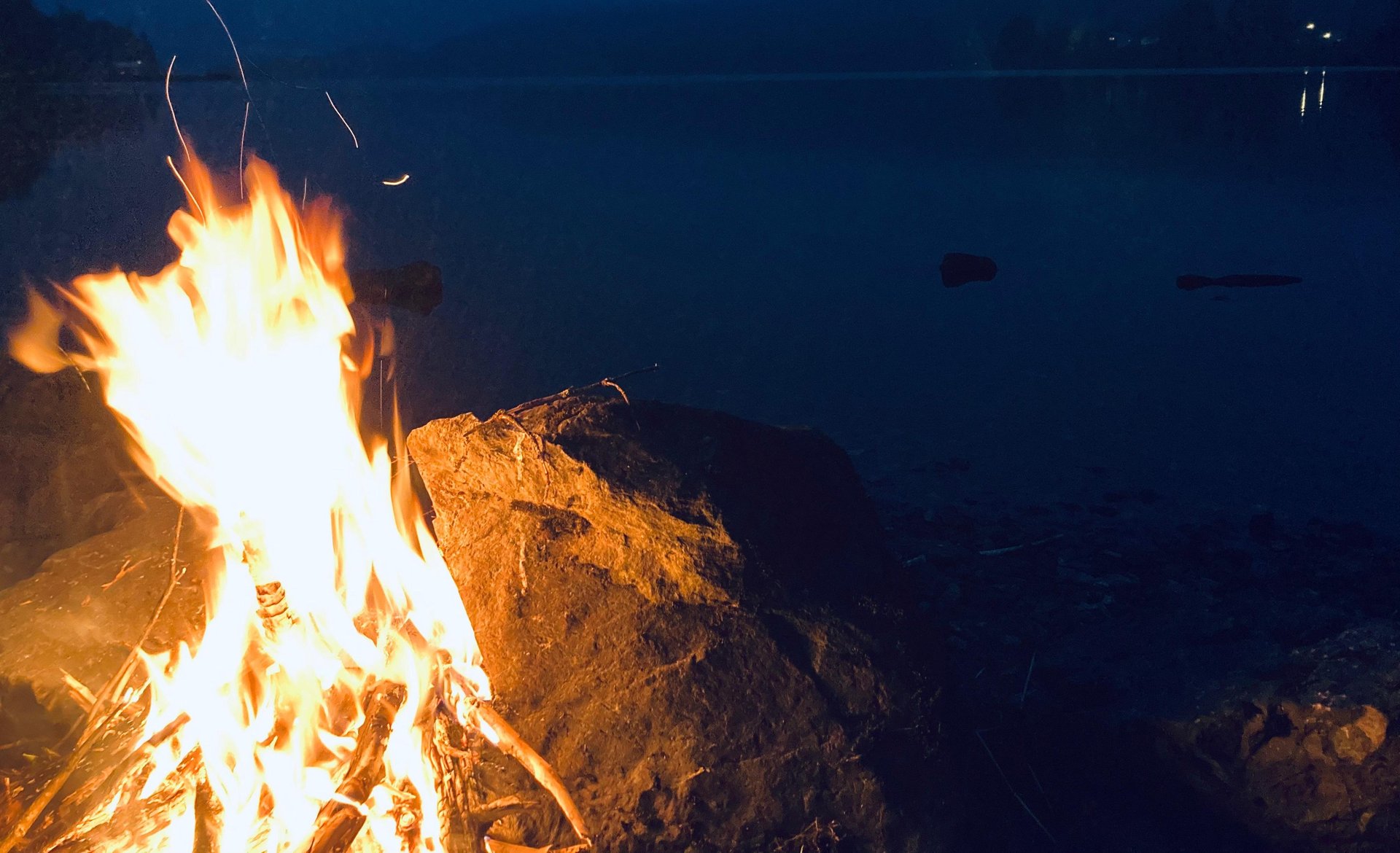
Die Red
The state of a soul at war
CONTEMPLATION
In honor of my friend Wayne.
I slip out of my hammock.
The forest is still dark, but dawn is approaching.
I lace up my boots and make my way to the fire pit.
Ashes now rest where flames once roared.
Kneeling down in the dirt, I hold my hand over the cinders, testing their temperature.
Cold. Gray.
Fire dies like us humans: gray.
Is that not what Emerson says?
We are born red, and we die gray.
I free the blade of my hatchet from a nearby log and sit down.
Why are these ashes cold?
I have built hundreds of bonfires. I have spent many nights huddled around flames, pondering, discussing, laughing. On many mornings after, I have returned to the fire pit and felt heat still radiating from the charred logs. Those warm ashes fill me with a very particular joy. They are reminders of an evening well spent.
Doesn’t Emerson say more, though? Surely, an essayist of such renown is not in the habit of confining himself to only a few words. Why do we, humans made of flesh and bone and soul, die gray like the cold ashes of a fire?
Our resemblance to silent ashes lies in our dedicating our lives to vanities that are unworthy of pursuit. We examine ourselves meticulously in mirrors, perfecting our skin, makeup, and fashion, obsessing over our appearance and ignoring the reflections of our souls. We derive purpose from pleasure, indulging in “sweet foods and strong wine”, and setting our hearts on material things that promise status and fulfilment … a horse and a rifle in Emerson’s 19th century; you can think of the modern equivalents yourself. We die gray because we find happiness in sharing and receiving a bit of gossip. We are pleased with the reassuring comfort of praise that reminds us we are in the right to pursue quests of such vileness. And I use that word, to a degree, though not exclusively, in its most archaic sense.
And how should one's soul respond to this benightedness?
Surely, it cannot do anything but laugh at such nonsense.
I hold my hand over the ashes once more.
Yes, they are cold.
Cold and gray.
Last night’s fire consisted of foraged sticks and twigs.
I piled them up, and the flames rose high. I stood in awe, impressed by my accomplishment and the scorching heat that lit up the night. But just as quickly as the fire grew, it died.
I could have tossed cardboard and paper atop it; I could have drenched it in gasoline, but the fire would not have lasted. It was a weak flame, destined to die fast and die gray. There was no other option than for the ashes to be cold this morning.
I pull my hand back.
Who is it then who dies gray?
“The little man”, Emerson clarifies. The little man is the one who dies cold and gray, life's fire having long extinguished before his last breath. The little man – that is to say, the average man … most men … most people; those who either naively or maliciously heed the call to throw sticks and twigs into life’s fire – sticks and twigs for a quick blaze rather than weighty logs that smolder for hours; those who, either out of despondency or cowardice, refuse to recognize their soul’s laughter of disbelief ... laughter of despair.
It is those who burn only for themselves and for nothing beyond themselves who die gray.
Perhaps then, I should aim to die red.
Perhaps then, if I abhor vanity and all the other sticks and twigs that fuel empty flames, I can live for something bigger. Perhaps I can have logs, heavy and substantial, fuel the fire.
I have placed logs into bonfires before. They burn for hours. And long after the flames retire, the coals still swelter so that when I revisit the fire pit the following morning, while dew still covers the grass and the sun has yet to rise, the cinders still glow, radiating heat beyond their brick confines.
So, it is the little man who dies gray and cold, having spent his life serving vanity and himself, having been forced into submission by his earthly impulse and desire … or perhaps more accurately put: having chosen to honor his earthly impulse and desire, for any mention of force assumes valiant resistance and refusal to form an allegiance with them.
But there are those few who die red.
Red, with embers glowing hot.
Red, having placed large timbers into their fires.
Red, like the blood coursing through their veins.
The man who dies red is the one who heeds a calling beyond his earthly impulse, beyond his desires, beyond even his vocation. He is the one who recognizes that his “soul is in a state of war” and that life and death are matters far beyond him. He is the one who burns passionately, selflessly, courageously until his last breath.
The man who dies red retains a hardy spirit despite his weakening body.
And just as scorching embers on a foggy morning are evidence of an evening well spent, a spirited, relentless soul betrayed by the weakening of its earthly body is evidence of a life well lived.
Sources: Ralph Waldo Emerson's "Heroism"

'Fireside' - even cold Alaskan nights cannot snuff out the flames.
